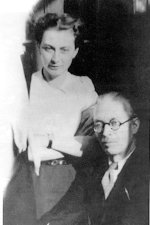The Bulletin
The
Newsweekly of the Capital of Europe October 19 2000

In World War Two hundreds of Allied aircrew shot down over Belgium were
saved by the heroism of a group of young volunteers - led by the 24
year old daughter of a Brussels schoolmaster. Andree de Jongh, known as
Dedee tells Shirin Wheeler the story of the Comet Line
Under a full moon in the autumn of 1942, Sgt Bob Frost and the four
other crew members of his Wellington bomber were on their way back from
Essen in Germany They had dropped a 1,800 kilo bomb on the Krupp arms
factory, but had been hit by anti-aircraft fire. Over Belgium, the
plane started to drop. At 16,000 feet, airgunner Frost donned
his parachute and bailed out.
"I came through a cloud, it was cold and wet. I was actually livid.
Only a week to go, two more missions before my tour of thirty was over.
Then the ground came up and hit me."
Frost landed in a field just outside the village of Kapellen in Flemish
Brabant. He was 19 years old, and alone in German-occupied
Belgium. But within six weeks, thanks to the efforts of an escape
network known as the Comet Line, he was back home and on leave in
London.
Now, 58 years later, Frost is returning to Belgium to meet some of the
men and women who risked their lives to rescue Allied airmen like him.
This weekend in Brussels and Namur, 20 former RAF aircrew will
join their old friends from the Comet Line. They will hold a special
Mass to remember those of their rescuers who were executed or died in
German concentration camps and prisons.
The Comet Line was one of the two rescue networks set up in Belgium to
spirit away aircrew who'd been shot down, and soldiers left behind
after Dunkirk. (The other was the Pat Line, run by "Pat O'Leary" -
Medecin-Capitaine Albert Marie Guerisse - which saved 600
fliers before being betrayed to the Gestapo in early 1942.) In the
three years it operated from 1941 to 1944, the Comet Line
saved an estimated 800 Allied airmen and soldiers from capture. They
were smuggled from Belgium through France and across the Pyrenees into
neutral Spain and out via Gibraltar.
It was funded by British military intelligence (MI9) in
London. But it depended on the courage and help of people in the
countryside and on the Resistance families in the cities who hid and
fed the foreigners until they could be moved. In doing so, they risked
arrest, torture and death. Helping fliers to evade capture was a
capital offence, and hundreds paid with their lives.
When Frost came down in Kapellen, he had the fortune to come across the
Vangilbergen family's farmhouse.
"I saw a house, and hoping an old lady would answer, I knocked at the
door. My guardian angel was working overtime. Actually it was a
strapping young fellow who spoke in Flemish. I answered in schoolboy
German and he slammed the door in my face. Eventually, I managed to
persuade him to let me in.
The Vangilbergens were the first people Frost met in occupied
Belgium - the first in a long line of citizens who risked everything to
help a young stranger in trouble.
"That morning the family left me in the house and went off to the
village fete. I remember watching the bicycle race from my window in
the attic."
They contacted members of the Comet Line. It wasn't hard because the
escape line had agents all over Belgium looking for stranded Allied
airmen.
Frost was taken to Brussels where he stayed first with a stockbroker at
the Brussels Bourse and then in Laeken with a with a widower running
his own Resistance group from a house in Avenue des Pagodes.
Issued with a suit, shoes and false identity papers, he became Robert
Simonis, a Belgian seaman who spoke a little German. "Simonis" lived in
Bordeaux but had been in Brussels to visit his sick mother. That gave
him an excuse to be travelling south. Via a network of around 1,000
people operating in Belgium and France, the Comet Line rolled into
action as it would for hundreds of other soldiers and airmen.
Comet had been the brainchild of a 24 year old woman, Andree de Jongh.
She is still living in Brussels in a small flat near the Place Meiser.
Physically frail now, she's lost none of the passion that earned her
the niclmame "Petit Cyclone".
Dedee (pictured with
her father)
helped rescue many Allied airmen
After the war, she was made a Countess by the King. In Britain she was
awarded the George Cross. Her voice quivers with emotion when she
recalls how, in May 1940, her schoolmaster father told her Belgium had
surrendered to German occupation after just 18 days.
They were in the family house in Avenue Emile Verhaeren. "I'd never
seen my father cry before - never. He said listen Belgium isn't
fighting anymore its given up. I was in despair and furious, enraged at
the same time. I said to my father, 'you are wrong to cry. You'll see
what we'll do to them. You'll see, they are going to lose this war.
They've started it, but they'll lose it. Don't worry." But I really
didn't have any idea how we would win.
It soon became clear. De Jongh set up a chain of safe houses in
Brussels and along the route to the Spanish border Then she travelled
to Spain with a party of rescued fliers to find support for her project.
The British, initially suspecting a Gestapo trap, soon realised the
value of what the young woman (codenamed "Postman", but known to her
London MI9 desk officer Airey Neave as Dedee) was offering to do for
them.
In 1941 an intelligence officer from the British Embassy in Bilbao
agreed to reimburse her travel costs if she could bring back
Allied airmen shot down over Belgium and northern France, escorting
them over the Pyrenees . The Comet Line had been born. There was no
shortage of volunteers from both friends and family (including de
Jongh's parents, aunt and older sister).
Frost remembers the first time he met de Jongh in a Brussels flat back
in 1942."it was her eyes, they were absolutely burning and there was an
air of supreme confidence about her."
For the 19-year-old air gunner, she and her other women comrades in the
Comet Line inspired adoration "I fell in love with them totally -
absolutely.We had complete trust in them. By the same token, they put
their trust in us."
It was Dedee herself, accompanied by a Basque guide, who escorted Frost
and four others to safety over the Pyrenees. She carried a rucksack
filled with civilian clothes for the airmen.
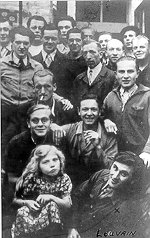 Keeping hope alive: Comet line
members pose at a 1943 meeting.
(JAC Note: This picture is actually
of an RAF man in hiding, Fred
Heathfield, and members of
the Louvain resistance.)
Keeping hope alive: Comet line
members pose at a 1943 meeting.
(JAC Note: This picture is actually
of an RAF man in hiding, Fred
Heathfield, and members of
the Louvain resistance.)
It was an arduous eight hour trek in silence through the night. The
airmen, who were known by members of the line as "the children", often
found the journey hard. De Jongh laughs and recalls how sometimes she
had to cajole them to carry on. "When one of the men sat down saying he
wasift going any further, I'd try to make him feel ashamed. 1
understood they hadift moved for weeks or months hiding in houses in
Brussels and Paris. It was difficult. But I was a little
shocked they weren't trying harder. We couldift just leave them,
either. They would have been found by the Germans and put the whole
line in jeopardy. And you know, when you've told someone they can trust
you, you say to yourself 'I have to get them across. I can't fail."
Frost remembers the gruelling walk, stumbling in the dark and wondering
how much longer they could go on. Dedee's stamina was clearly
extraordinary. Before her arrest, she did the walk many times and
personally led 118 men over the mountains, 80 of them Allied airmen.
When they got into Spain, the men rested at a safe house but de iongh
car- ried on and phoned her contact at the British Embassy to send the
diplomatic car. She would hand over her precious charges on the road to
Madrid.
"I have really awful memories of that. All those men, they were our
children, it's true. We were so attached to them. In fact we still are.
As soon as we spotted the car, there was no time to say
goodbye. They ran. We had spent three days together - we couldn't even
say goodbye. My heart would melt, but at the same time I was so happy."
The members of the Comet Line paid a terrible price. Betrayals and
infiltration led to hundreds of arrests and deaths. Dedee was caught
when bad weather delayed crossing the Pyrenees in January 1943 and,
under interrogation, one of the RAF fliers identified both his helpers
and the Line's safe houses to the Gestapo. For months, it seemed that
the Comet Line had been shattered. But it was re-established by Baron
Jean Greindl (codenamed Nemo). For all the betrayals, the
arrests and executions, there was always someone willing to take over.
When Frost and his fellow airmen come over to Belgium at the weekend,
they'll be visiting the Namur citadel where many people were executed
by firing squads.
De Jongh says she always warned anyone volunteering for the Comet Line
to expect to be shot or captured within six months. But that didn't put
off 17-yearold Andree Dumon.
Codenamed Nadine, she began by delivering messages for the line and
carrying copies of La Libre Belgique, which had been banned and gone
underground. She graduated to smuggling the airmen to Paris or
Valenciennes by train. It is extraordinary to imagine this teenager at
the French border calmly dealing with German officers as they examined
the airmen's forged papers. But she is remembered for her perfect "sang
froid" and her permanent smile.
A grandmother today, she has kept that smile. Dumon is still living in
the family home in Uccle where, at the age of 20, she and her parents
were arrested after an informant betrayed them to the Gestapo.
"I can still hear my grandfather shouting 'German police!' I'll never
forget it. We were all still in bed, it was seven in the morning. My
father told me to try and escape, so I got onto the roof. Then I saw
that the Germans had surrounded the house - their revolvers were
pointed at me and I knew they would shoot. So I gave myself up," she
says in a surprisingly youthful voice.
Both Dumon and de Jongh spent nearly three years in prisons and
concentration camps. When Germany surrendered in 1945, they emerged
from Mauthausen gravely ill and undernourished. But many of their
comrades from the Comet Line did not survive the camps, Dumon's father
among them. She was sent to Ravensbruck. "You go through those huge
doors. I can only say it was like entering the gates of hell. It's hard
to talk about," she says. "But they didn't break my spirit. I am glad
to say I never waxed the SS guards'shoes for an extra bowl of soup,
though I was certainly hungry."
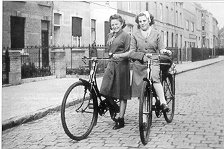 Butter wouldn't melt:Andree Dumon (left) and her
sister Michou did much of their resistance work by bike
Butter wouldn't melt:Andree Dumon (left) and her
sister Michou did much of their resistance work by bike
Some might have wondered if all the suffering was worth it - but the
British told them the Comet Line was making a huge difference. Not just
because it was getting the pilots, radio operators and navigators home,
but because men believed that if they were shot down, they would be
rescued and would find friends in occupied Belgium. That was a huge
boost to morale.
Dumon is quite clear about what kept her going. "It was for freedom,
against the occupier. We did everything we could against the occupier.
I got one airman through who, after he got back, went on another
mission and bombed two U boats, German submarines. He was decorated for
that as well."
There is hardly a day that passes that Frost doesn't reflect on the
sacrifices members of the Comet Line made for him and his fellow
airmen. He knows things could have been very different if someone else
had opened the door in the village of Kapellen. Instead, the Comet Line
delivered the teenage airman back to his mother in Clerkenwell, not
much more than a month after he'd been reported missing.
"I have nothing but the utmost respect for the people who worked in the
Comet Line," he says. "They knew the price if they were caught. It was
heroism beyond anything I can tell you. When we got' home we could go
out, show off our airforce wings and lead a normal life. These
people could not. They had to remain quiet, carrying on with things and
hoping there wasn't going to be a knock on the door."
After the war, Frost and Dumon became close friends. She is
now the torchbearer for the memory of the Comet Line. She has also
organised this weekend's reunion of airmen and Comet Line members in
Brussels.
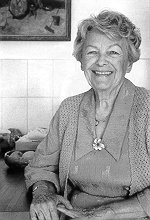 Freedom fighter: today.Andree Dumon
is a grandmother living in Uccle.
Freedom fighter: today.Andree Dumon
is a grandmother living in Uccle.
She thinks both sides still have a need to meet, perhaps' to express a
mutual gratitude. "The airmen feel they can't thank us enough.
We say if it wasn't for the English we might be German now."
Next year, they'll celebrate the 60th anniversary of the Comet Line.
"Our own children don't seem that interested," Andree Dumon says, "but
then we didn't really speak about it to them. Maybe it was too painful.
You know, my father died - I would so much have liked to have known him
as an adult. Now I think we have to tell our story because younger
people really should know - for the sake of those who died."
next page
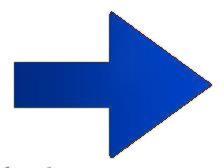
Click on www.belgiumww2.info
to go to HOMEPAGE


